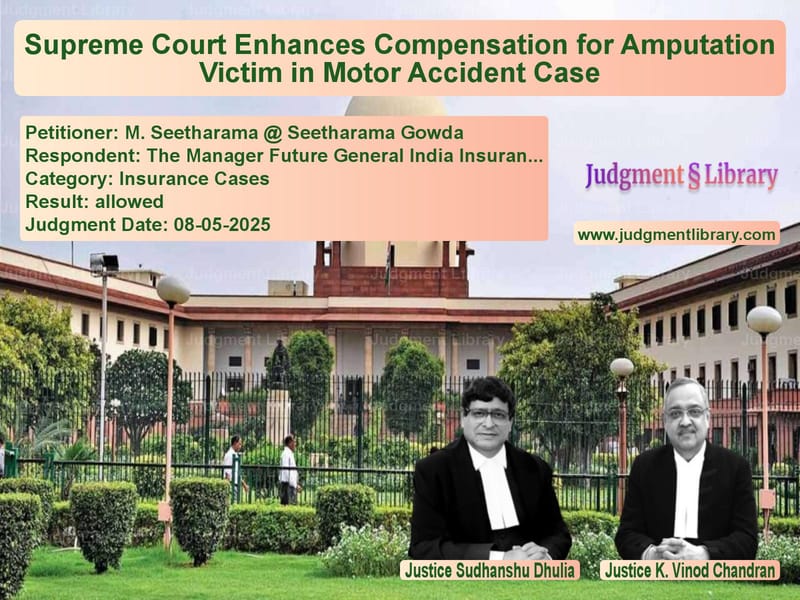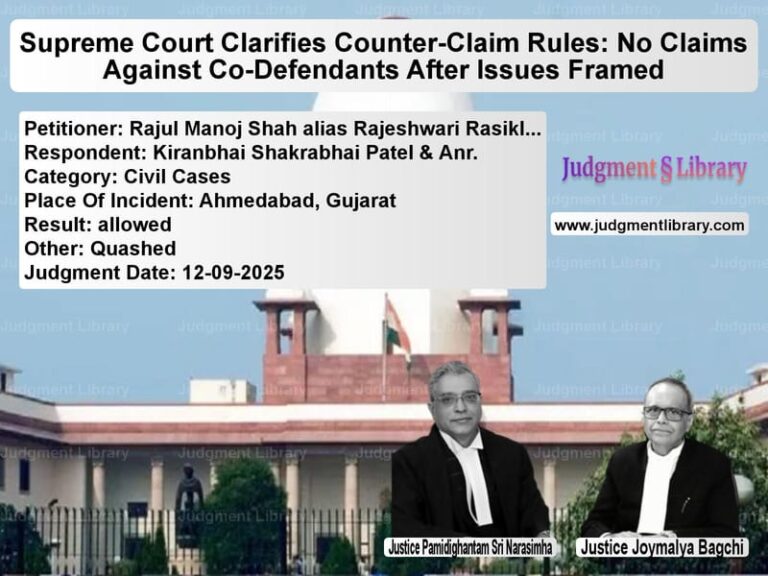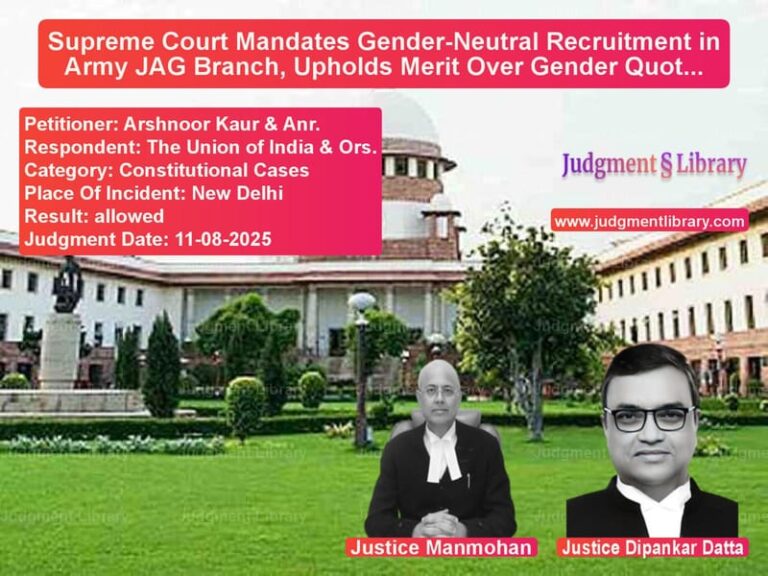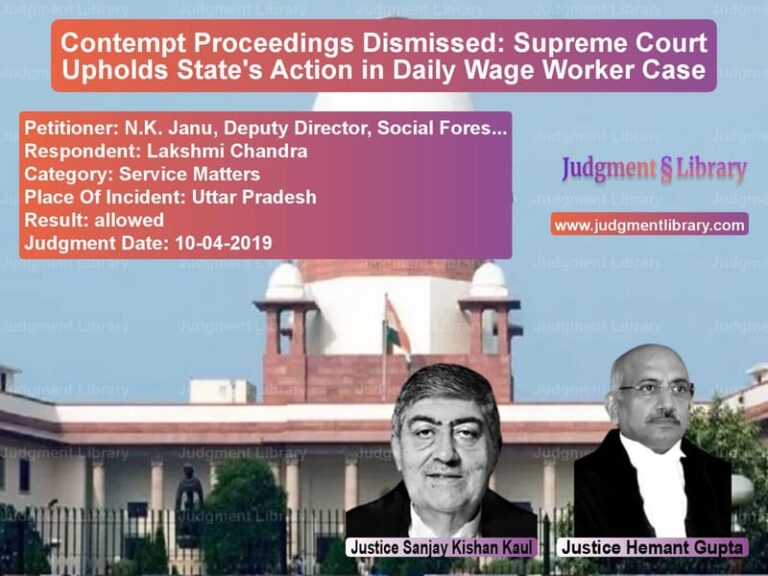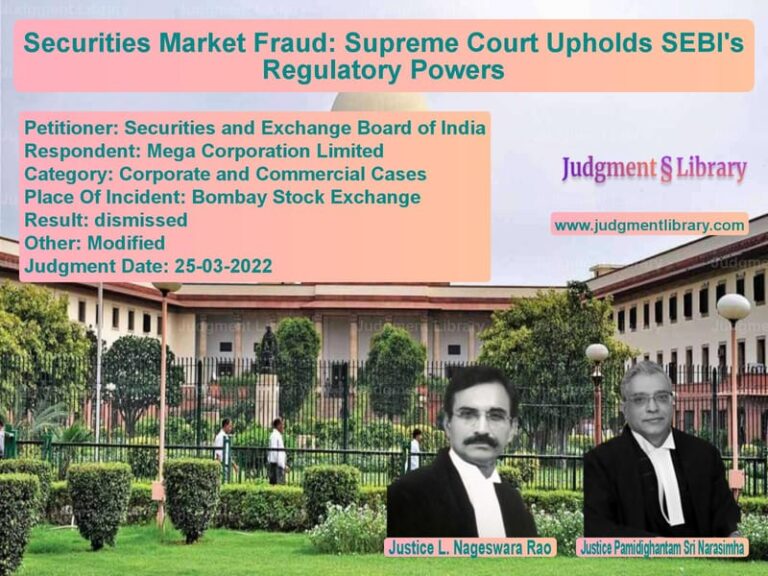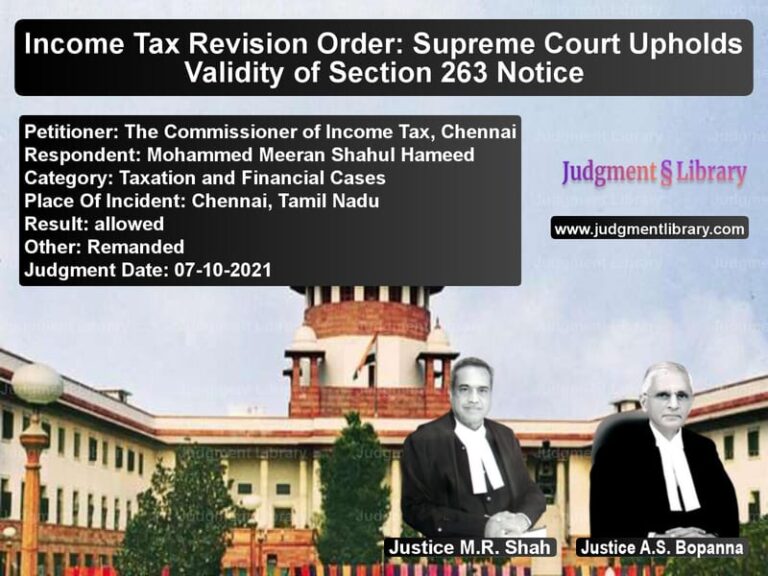Supreme Court Enhances Compensation for Amputation Victim in Motor Accident Case
In a landmark judgment that underscores the importance of adequate compensation for accident victims, the Supreme Court of India has enhanced the compensation awarded to a man who suffered a severe leg amputation in a road accident. The case of M. Seetharama @ Seetharama Gowda versus The Manager Future General India Insurance Co. Ltd. & Ors. represents a significant development in motor accident compensation jurisprudence, particularly concerning the proper assessment of damages for permanent disabilities and the calculation of income for unskilled workers.
The tragic incident that led to this legal battle occurred on June 25, 2015, when Seetharama was riding his motorcycle and collided with a jeep. According to the First Information Report (FIR) registered after the accident, the jeep driver was operating his vehicle at high speed on the wrong side of the road in a rash and negligent manner. The collision resulted in severe injuries to Seetharama, who was immediately taken to a local hospital for first aid before being transferred to a specialist hospital where he remained admitted for approximately one and a half months.
The injuries sustained by Seetharama were particularly severe, including multiple fractures and vascular compromise that ultimately led to what is medically known as Syme’s amputation. This specific type of amputation occurs at the ankle joint while preserving the heel pad, allowing for some weight-bearing capability. Despite this medical advantage, the amputation represented a life-altering injury for the 38-year-old man, who claimed to have been earning Rs. 12,000 per month prior to the accident.
The legal journey began before the Motor Accidents Claims Tribunal, which awarded Seetharama a total compensation of Rs. 6,60,000 under various heads. Dissatisfied with this amount, Seetharama approached the High Court, which enhanced the compensation to Rs. 12,65,000. While this represented a significant improvement, Seetharama still believed the compensation was inadequate given the severity of his injuries and their impact on his future earning capacity, leading him to approach the Supreme Court.
The Supreme Court bench comprising Justice Sudhanshu Dhulia and Justice K. Vinod Chandran carefully examined the case and delivered a judgment that provides important clarifications on several aspects of motor accident compensation. The court’s analysis began with the compensation for pain and suffering, where the Tribunal and High Court had awarded Rs. 1,20,000. The Supreme Court noted the particularly severe nature of Seetharama’s injuries, observing that “the appellant suffered multiple injuries and had a fracture in the right femur, right clavicle, right tibia and fibula with vascular compromise.” Considering the overall suffering and the specific nature of the Syme’s amputation, the court enhanced this compensation to Rs. 1,50,000.
One of the most significant aspects of the judgment relates to the assessment of medical expenses. Despite producing medical bills totaling Rs. 1,86,486, the Tribunal and High Court had awarded only Rs. 1,90,000, which included amounts for special diet, conveyance, and attendant charges. The Supreme Court took a principled stand on this issue, stating clearly that “the medical bills proved has to be granted in full” and separately awarding Rs. 30,000 as a composite amount for special diet, conveyance, and attendant charges.
The calculation of loss of future income formed another crucial part of the Supreme Court’s analysis. The Tribunal had adopted an income of Rs. 7,000 per month, which the High Court enhanced to Rs. 9,000. However, the Supreme Court found both these figures inadequate. Referring to the precedent set in Ramachandrappa v. Royal Sundaram Alliance Insurance Co. Ltd., where a coolie’s income was determined at Rs. 4,500 in 2004, and applying the principles established in Pranay Sethi regarding incremental increases, the court determined that “the salary of an unskilled worker will be Rs. 10,000/- in the year 2015 when the accident occurred.” The court further elaborated that “there can be an incremental increase for every year which at the least will be at Rs. 500/- for every successive year.”
The Supreme Court also addressed the issue of future prospects, noting that when assessing loss of income for 50% disability, as held by the High Court, “necessarily, 40% for future prospects has to be added.” This addition is particularly important as it acknowledges that even unskilled workers would likely have seen their incomes increase over time had the accident not occurred.
In its final calculation, the Supreme Court awarded compensation under the following heads: Rs. 1,50,000 for pain and suffering; Rs. 1,86,486 for medical expenses (the exact amount proved through bills); Rs. 30,000 for special diet, conveyance, and attendant charges; Rs. 10,000 for loss of amenities; Rs. 12,60,000 for loss of future income (calculated as Rs. 10,000 x 140% x 12 months x 15 years x 50% disability); Rs. 25,000 for future medical expenses; and Rs. 45,000 for loss of income during hospitalization. The total compensation amounted to Rs. 17,06,486.
The Supreme Court directed that the awarded amounts “shall be paid within a period of two months from today with interest @ 9% per annum” and that “whatever amounts have already been paid shall be deducted.” The court also specified that “the appellant shall provide the bank account details to the Insurance Company who shall transfer the amount online within the period specified hereinabove.”
This judgment is significant for several reasons. First, it reinforces the principle that compensation must be adequate and not merely symbolic, especially in cases involving permanent disabilities. Second, it provides clear guidance on the calculation of income for unskilled workers, acknowledging the reality of increasing wages over time. Third, it establishes that proved medical expenses should be compensated in full, without arbitrary reductions. Finally, the judgment emphasizes the importance of proper compensation for non-pecuniary damages like pain and suffering, particularly in cases involving severe and life-altering injuries.
The Supreme Court’s approach in this case demonstrates a humane and practical understanding of the real impact of accidents on victims’ lives. By enhancing the compensation to adequately reflect the severity of the injury and its long-term consequences, the court has ensured that justice is not just done, but seen to be done. The judgment serves as an important precedent for future cases involving permanent disabilities and will likely influence how courts across the country assess compensation in similar circumstances.
For accident victims and their families, this judgment offers hope that the judicial system recognizes the profound impact of serious injuries and is willing to ensure that compensation truly reflects the loss suffered. For insurance companies and legal practitioners, it provides clearer guidelines on how compensation should be calculated, particularly regarding income assessment for unskilled workers and the treatment of proved medical expenses.
As road accidents continue to be a significant public health concern in India, judgments like this play a crucial role in ensuring that victims receive fair compensation that enables them to rebuild their lives with dignity and financial security. The Supreme Court’s careful balancing of legal principles with practical realities in this case sets a valuable precedent for the compassionate yet principled adjudication of motor accident claims.
Petitioner Name: M. Seetharama @ Seetharama Gowda.Respondent Name: The Manager Future General India Insurance Co. Ltd. & Ors..Judgment By: Justice Sudhanshu Dhulia, Justice K. Vinod Chandran.Judgment Date: 08-05-2025.Result: allowed.
Don’t miss out on the full details! Download the complete judgment in PDF format below and gain valuable insights instantly!
Download Judgment: m.-seetharama-@-seet-vs-the-manager-future-g-supreme-court-of-india-judgment-dated-08-05-2025.pdf
Directly Download Judgment: Directly download this Judgment
See all petitions in Motor Insurance Settlements
See all petitions in Compensation Disputes
See all petitions in Road Accident Cases
See all petitions in Third-Party Insurance
See all petitions in Insurance Settlements
See all petitions in Judgment by Sudhanshu Dhulia
See all petitions in Judgment by K. Vinod Chandran
See all petitions in allowed
See all petitions in supreme court of India judgments May 2025
See all petitions in 2025 judgments
See all posts in Insurance Cases Category
See all allowed petitions in Insurance Cases Category
See all Dismissed petitions in Insurance Cases Category
See all partially allowed petitions in Insurance Cases Category

